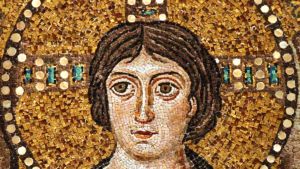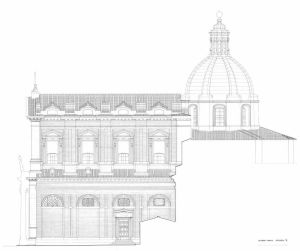
don Giuseppe Nespeca
Giuseppe Nespeca è architetto e sacerdote. Cultore della Sacra scrittura è autore della raccolta "Due Fuochi due Vie - Religione e Fede, Vangeli e Tao"; coautore del libro "Dialogo e Solstizio".
Against the tide Transfiguration: Faith and Metamorphosis
RELIGIOUS SENSE AND PSYCHE (by Francesco Giovannozzi, psychologist and psychotherapist)
Reflections on the religious sense.
This reflection also stems from a dialogue with a gentleman of about my age.
This well known and respected gentleman in his village met an old acquaintance of his and was rebuked by the latter because he did not attend religious services; according to her, he should have done so for his own good. The gentleman replied that he did not feel this need and that it did not seem to him that his behaviour might offend the generally understood religious sense.
Discussions like this occur often among human beings, this is nothing new. I report it because it made me reflect on the religious sense in human life. The topic touches on several disciplines and is complex.
Studies by Fiorenzo Facchini say that various behaviours of prehistoric man are read in a religious sense. Our ancestors gave burials to their dead and painted representations on the walls.
These caves had something sacred about them. Religious manifestations of antiquity were songs and dances.
In all religions we find a need for reassurance about our lives and also the need to find magical answers to our problems.
Bettelheim argues that on an individual level and especially in childhood, religion can provide that basis of stability and security with which the child can evolve towards autonomy.
The society in which we live forces us to run, to be in step with the times; it wants to give us its values.
Today there is the fashion of the ephemeral, of competitiveness - and so it is psychologically reassuring to believe in a 'mother-environment' that loves us, or to be within a design that gives meaning to our lives.
Unlike Freud who did not have a positive view, or the philosopher Charles Marx who claimed that religion is the opium of the people, Jung in the eleventh volume "Psychology and Religion" says verbatim:
"Since' religion is indisputably one of the first and universal expressions of the human soul [...] it is not only a sociological or historical phenomenon, but an important personal matter" (vol.XI, p.15).
In my long professional practice I have often encountered people who have had to come to terms with this issue.
The therapist's task is not to condition the other, but to clarify the underlying dynamics.
I have met people who described themselves as non-believers but who on an unconscious level had to come to terms with their dreams. Or individuals who belonged to different religions that were so rigid that they inhibited their vital sense.
In all these cases, knowledge of the human soul grew, whether they claimed to be religious or not. We are not discussing each person's philosophical position.
There were differences between the person who called himself religious and one who was not.
I would like to point out that these differences do not constitute value judgements, but only behavioural characteristics.
The religious person believes that there is a reality that is sacred and beyond this world - and that his existence is enhanced according to his belief.
He who called himself a non-believer rejected transcendence, was one who is self-made and believes that he alone constructs his own destiny.
A constant concern was to deny any reference or wisecrack that was made to religious topics.
I have even met someone who was more concerned about what my beliefs were than his personal problems. I always replied that my sphere of action was the psyche in all its manifestations. Beyond any manifestation sacred or not, respect for the person is already a sacred attitude.
"To 'desacralise' oneself completely is not easy either, as it is difficult to deny history altogether - both for those who believe in creation and those who believe in evolution.
Who knows whether evolution includes a creation?
Dr Francesco Giovannozzi Psychologist-psychotherapist
All Jesus, and the Temptations… trials for Life
Blind, guide of the Blind. Beam and Straw. Tree and Fruit
Loving enemies and turning the other cheek: whyever?
Beatitudes of role reversal
From «Master» to «Lord», ‘Word’ that realizes
Presentation of the Lord
Jesus in the Synagogue, to return to the Father's Dream
Wedding at Cana: between water and wine... desolation or love
Only through Christ can we converse with God the Father as children, otherwise it is not possible, but in communion with the Son we can also say, as he did, “Abba”. In communion with Christ we can know God as our true Father. For this reason Christian prayer consists in looking constantly at Christ and in an ever new way, speaking to him, being with him in silence, listening to him, acting and suffering with him (Pope Benedict)
Solo in Cristo possiamo dialogare con Dio Padre come figli, altrimenti non è possibile, ma in comunione col Figlio possiamo anche dire noi come ha detto Lui: «Abbà». In comunione con Cristo possiamo conoscere Dio come Padre vero. Per questo la preghiera cristiana consiste nel guardare costantemente e in maniera sempre nuova a Cristo, parlare con Lui, stare in silenzio con Lui, ascoltarlo, agire e soffrire con Lui (Papa Benedetto)
In today’s Gospel passage, Jesus identifies himself not only with the king-shepherd, but also with the lost sheep, we can speak of a “double identity”: the king-shepherd, Jesus identifies also with the sheep: that is, with the least and most needy of his brothers and sisters […] And let us return home only with this phrase: “I was present there. Thank you!”. Or: “You forgot about me” (Pope Francis)
Nella pagina evangelica di oggi, Gesù si identifica non solo col re-pastore, ma anche con le pecore perdute. Potremmo parlare come di una “doppia identità”: il re-pastore, Gesù, si identifica anche con le pecore, cioè con i fratelli più piccoli e bisognosi […] E torniamo a casa soltanto con questa frase: “Io ero presente lì. Grazie!” oppure: “Ti sei scordato di me” (Papa Francesco)
Thus, in the figure of Matthew, the Gospels present to us a true and proper paradox: those who seem to be the farthest from holiness can even become a model of the acceptance of God's mercy and offer a glimpse of its marvellous effects in their own lives (Pope Benedict))
Nella figura di Matteo, dunque, i Vangeli ci propongono un vero e proprio paradosso: chi è apparentemente più lontano dalla santità può diventare persino un modello di accoglienza della misericordia di Dio e lasciarne intravedere i meravigliosi effetti nella propria esistenza (Papa Benedetto)
Man is involved in penance in his totality of body and spirit: the man who has a body in need of food and rest and the man who thinks, plans and prays; the man who appropriates and feeds on things and the man who makes a gift of them; the man who tends to the possession and enjoyment of goods and the man who feels the need for solidarity that binds him to all other men [CEI pastoral note]
Nella penitenza è coinvolto l'uomo nella sua totalità di corpo e di spirito: l'uomo che ha un corpo bisognoso di cibo e di riposo e l'uomo che pensa, progetta e prega; l'uomo che si appropria e si nutre delle cose e l'uomo che fa dono di esse; l'uomo che tende al possesso e al godimento dei beni e l'uomo che avverte l'esigenza di solidarietà che lo lega a tutti gli altri uomini [nota pastorale CEI]
St John Chrysostom urged: “Embellish your house with modesty and humility with the practice of prayer. Make your dwelling place shine with the light of justice; adorn its walls with good works, like a lustre of pure gold, and replace walls and precious stones with faith and supernatural magnanimity, putting prayer above all other things, high up in the gables, to give the whole complex decorum. You will thus prepare a worthy dwelling place for the Lord, you will welcome him in a splendid palace. He will grant you to transform your soul into a temple of his presence” (Pope Benedict)
San Giovanni Crisostomo esorta: “Abbellisci la tua casa di modestia e umiltà con la pratica della preghiera. Rendi splendida la tua abitazione con la luce della giustizia [...]
duevie.art
don Giuseppe Nespeca
Tel. 333-1329741
Disclaimer
Questo blog non rappresenta una testata giornalistica in quanto viene aggiornato senza alcuna periodicità. Non può pertanto considerarsi un prodotto editoriale ai sensi della legge N°62 del 07/03/2001.
Le immagini sono tratte da internet, ma se il loro uso violasse diritti d'autore, lo si comunichi all'autore del blog che provvederà alla loro pronta rimozione.
L'autore dichiara di non essere responsabile dei commenti lasciati nei post. Eventuali commenti dei lettori, lesivi dell'immagine o dell'onorabilità di persone terze, il cui contenuto fosse ritenuto non idoneo alla pubblicazione verranno insindacabilmente rimossi.



















